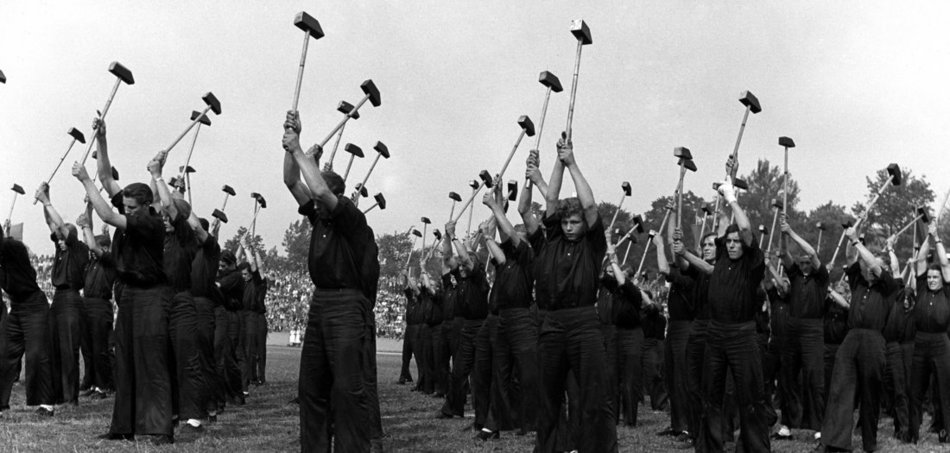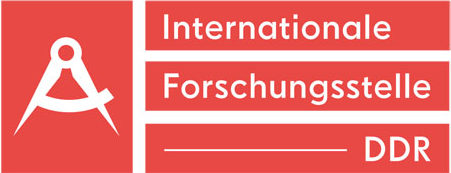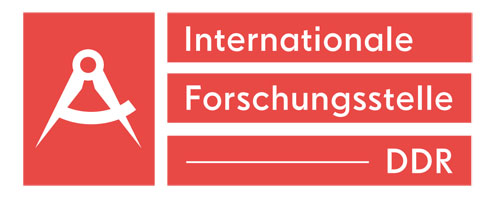On 06.05.2021, the German daily, the junge Welt interviewed two members of the International Research Center DDR (IF DDR) with regard to the backdrop, methods and objectives of the organization.
“Following-up on solidarity work”

You founded the “International Research Center GDR” (IF DDR) in 2019. What exactly is it all about?
Florentine Morales Sandoval: After the International Rosa Luxemburg Conference in Berlin in 2018, there was a DDR-South Africa solidarity meeting where we met with representatives of the South African trade union NUMSA and staff from the Tricontinental Research Institute. A former ANC (African National Congress of South Africa) militant was also present at the meeting. The core question at the fore, was how progressive movements worldwide can learn from the experience of the former German Democratic Republic (DDR). Furthermore, it became clear that in many countries there remain very positive memories of the solidarity efforts endeavoured by the GDR and that these undertakings should have continuity. In 2019, the IF DDR was launched to that end.
You are a small team of young humanities scholars from East and West Germany. Where does the interest of these young academics in the GDR stem from?
Max Rodermund: It is the perceptible crisis manifestations of capitalism today that are tending to impel a change in the perception of the GDR. Against this background, alternatives to capitalism are becoming more and more interesting for more people, especially young people. This will not necessarily lead to a change in the character of the official historiography, but it is becoming increasingly difficult to maintain a reductionist narrative of mass surveillance, injustice and economic scarcity in the face of today’s problems, – for example regarding public housing and health policy, – as well as concerning worldwide military threatening posturings. We ourselves did not get to expeience the GDR, but we are interested in the process of building socialism because it provides important perspectives for the social issues of our time.
But why should we still be concerned with the GDR more than three decades after the failure of the first attempt at socialism in this country?
M. R.: In the GDR, the economic and political power of private property was disposed of. It was a real alternative to capitalist society. A critique of existing conditions must assimilate these experiences in a serious manner and incorporate them.
The ignorance and arrogance with which the GDR is often dealt with in Germany, – even in left-wing circles, – is fatal in our view. This shows the effect of the official historical review. Significantly, it is precisely from movements in other countries that there is interest in learning more about the GDR. And we want to make this access available.
How exactly does one have to imagine your work when you write that you want to examine and evaluate “the socialist conditions of the GDR that emerged at the time in sharp contrast to the capitalist Federal Republic of Germany (FRG) system limits”? How do you proceed? Which sources do you evaluate?
F. M. S.: The competing systems which were directly manifest between the FRG and the GDR for more than 40 years, essentially determined the political events of the time. This global political context constituted the framework conditions of the entire political, economic, social, cultural developments of the GDR and led to many contradictions and difficulties in the construction of socialism. In our first issue, “Risen from Ruins” of our series “Studies on the GDR”, we present this context through a close examination of the founding conditions of the GDR.
For our publications, we draw on contemporary sources from East and West as well as current scholarly literature. Another central concern of the research center are interviews with contemporary witnesses.
Is your work then, really scientific research or is it more or less already established that the GDR was the all-around better German state?
M. R.: We want to understand the achievements and defeats of 40 years of socialism in order to learn from them. There is nothing to be gained by claiming that the GDR was simply better. But on the question of scientific objectivity, it can be said that it is precisely the premise of the prevailing view of the GDR in which the result is already certain: The GDR must be bad because socialism is wrong. Not every scientist necessarily starts with this precondition, but the constraints of the scientific enterprise, – first and foremost the question of funding, – but also of academic recognition, repeatedly promote this basic attitude toward the GDR.
As you have already mentioned, you work closely with the globally organized research institute, the “Tricontinental: Institute for Social Research”. What are the benefits of this cooperation for your work?
F. M. S.: It is not about a benefit for us, but for our readership. The impetus for founding the research center was to share the experience of building socialism with movements, especially in the Global South, that are currently engaged in social struggles accompanied by debates about social alternatives. This is precisely where we want to contribute and show solidarity. As an example, the land reform in the area of the later GDR can be well cited, in which there is a great interest of the landless movements in South Africa and Brazil. The Tricontinental as a partner conveys to us the concerns of these movements, with which they themselves are closely connected.
You announce on your website that you want to take a closer look “at internationalism and the relations of state and social actors in the GDR to other countries and anti-colonial movements.” Was the GDR’s internationalism really so altruistically motivated?
M. R.: Of course it was not altruistic. What is decisive is that the GDR’s interest coincided with the interests of the liberation movements and the oppressed. But you don’t have to be a communist to see that the GDR’s international solidarity for the people on the ground was in sharpest contrast to the foreign policy of the imperialist states. So the question is, who did the solidarity efforts benefit? Not the capitalist economic interests, but the working class worldwide. In the long run, of course, the goal was to strengthen the socialist camp. “Unselfishness” here leads to a conceptual dead end.
In our research series “Friendship!” we trace the many solidarity projects of the GDR, precisely in order to clarify the question of what characterized its international relations.
You want to illuminate all aspects of GDR society and thus broaden the view of fundamental possibilities and difficulties of alternative social, economic and political development. Isn’t that a bit ambitious for a small institute?
F. M. S.: Sure, we can’t do everything at once. We grow ourselves with the topics. Our “Studies on the GDR” initially have an overview character. We are driven by the usefulness of the research work for progressive movements worldwide. This, along with the support of DDR experts on a variety of topics, helps us focus our work. For example, in light of the corona pandemic, our second issue of the “Studies” series is devoted to health care in the GDR.
Who benefits from your work in the end?
F. M. S.: We offer research and educational materials to promote an international exchange about a part of the history of the labor movement. Conversely, we also need to engage with the history and political processes in Chile, South Africa, Vietnam and elsewhere in order to write texts that our international audience can relate to. We see ourselves as a scholarly interface between discourse and action. In the spirit of popular education, we therefore strive to create an accessible entry point to the topic — from which everyone can benefit.
Can former citizens of the GDR support your research?
M.R.: Absolutely! Some time ago, we had already launched an appeal in the junge Welt, explicitly looking for contemporary witnesses who had been involved in the GDR’s solidarity projects at home and abroad. This resulted in exciting contacts. We now inform once a month in a newsletter about the status of our work and about planned interview projects, and we welcome feedback. Precisely because our research does not embed the experiences of GDR citizens in the narrative of the “unjust state,” we have received good feedback so far.
Background: International Research Center GDR
The Berlin-based International Research Center GDR (IF DDR) focuses in particular on internationalism and the relations of state and social actors in the GDR with other countries and anti-colonial movements. In many countries in Latin America, Africa and Asia, the positive impulses for economic and political sovereignty, such as those set by the GDR with numerous solidarity projects, have been remembered, the researchers write on their website. Where economic and social alternatives to the existing ones are once again in demand, where anti-colonial, anti-capitalist and socialist movements are once again forming, there is also a spike in interest in the experiences and developments of the GDR.
With a small team from the East and West, the IF DDR sifts through and sorts existing literature, combines it with first-hand experiences in eyewitness interviews and, on this basis, develops scientifically sound and descriptive publications in a wide variety of media formats. With its studies, the IF DDR aims to “contribute to current debates on social struggles and political alternatives that are fed by the conditions and experiences of GDR socialism.”
Already, a number of publications on various aspects of the GDR can be found on the research center’s homepage. The first issue of “Studies on the DDR”, for example, traces the emergence of the GDR after the Second World War and “follows its development from an anti-fascist democratic state to a socialist one”. Central to this is “the economic starting position, which was particularly difficult after the war and due to the reparations and determined economic life,” the scholars conclude. Consequently, the text focuses on the economy of the GDR, its achievements as well as its contradictions. In addition, information is provided about central characteristics of socialist society and work such as: international solidarity, collective organization in state-owned enterprises, and planned economy. In the near future, publications on health care in the GDR and the land reform carried out in the later territory of the GDR are to follow. The series is intended to “provide the basis for an international exchange about the GDR by tracing the construction of this socialist state and its reality of life on the basis of selected aspects of everyday life.” The series “Friendship!” is in preparation; it will be devoted to the socialist maxim of international solidarity and will explore the GDR’s international relations as well as their effects and after-effects. (bern)

